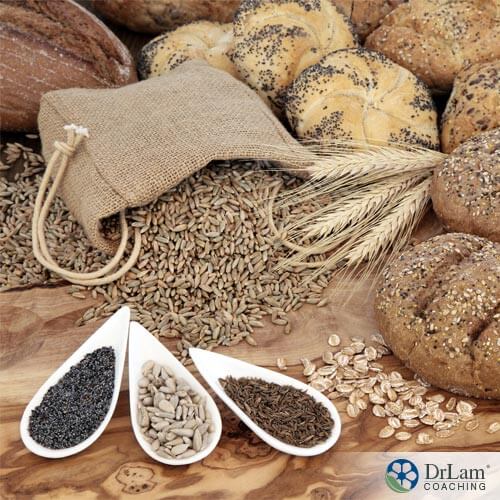 Soft fluffy white bread rolls are an all time favorite. Yet the current advice is that wheat bread is considered healthier than white. However, new findings reveal that it may actually be your gut bacteria that determine which bread is better for you. This means that the type of bread which is good for you may not be good for another person, and vise versa. Further, researchers suggest that neither white nor wheat bread is necessarily better for you - it all depends on your body. These new findings could perhaps make the task of choosing the right food for you much easier.
Soft fluffy white bread rolls are an all time favorite. Yet the current advice is that wheat bread is considered healthier than white. However, new findings reveal that it may actually be your gut bacteria that determine which bread is better for you. This means that the type of bread which is good for you may not be good for another person, and vise versa. Further, researchers suggest that neither white nor wheat bread is necessarily better for you - it all depends on your body. These new findings could perhaps make the task of choosing the right food for you much easier.
There is a host of healthy bacteria residing in your body which plays a crucial role in various body functions. The bacteria present throughout your intestinal tract plays an important role in good health. They help in digestion and extracting nutrients from the food you eat. Any imbalance in the gut microbiome can affect your body’s nutrient absorption process. This can lead to low energy levels and fatigue.
Most of your neurotransmitters are present in the gut. Therefore, poor gut health can affect your body’s ability to deal with stress, and it can raise the chances of chronic fatigue. Gut bacteria also plays a significant role in enhancing mood, developing a strong immune system, maintaining healthy digestion, and reaching your ideal body weight.
Any decline in the level of these microbes can lead to poor health. When the gut microbes are not functioning optimally, it can lead to many health issues including bloating, food sensitivities, type 2 diabetes, autoimmune conditions, and atherosclerosis. Eating a healthy diet geared towards enhancing gut bacteria could prove helpful in maintaining gut health and overall well-being.
Most health-conscious people, especially those with diabetes, spend extra money on whole wheat bread thinking that the higher fiber and lower glycemic index is better for their bodies. But is this true? Does eating whole-wheat bread lower your blood sugar levels and risk of diabetes? New findings can shed light on the question.
Traditional thinking holds that whole wheat bread comes with nutrient-rich compounds intact. But in refined flour, the nutrients are stripped off during processing. Therefore, white bread prepared from refined flour is considered unhealthy and linked with increased blood sugar spikes. However, new findings suggest something else.
According to a recent study published in the journal Cell Metabolism, the type of bread that is better for you depends on your gut bacteria. Eran Elinav, the lead author of the study and an immunology researcher at the Weizmann Institute of Science stated that the team focused on bread as it is the most consumed food worldwide and accounts around 10 to 40 percent of daily calorie intake.
The study reveals that blood sugar spikes from white bread or whole wheat bread actually depend on the microbes residing in your gut. Along with Elinav, researchers from Tel Aviv University and Tel Aviv Sourasky Medical Center conducted the two weeks study on 20 voluntary participants. The study participants were given six meals of bread per day.
In the first week, ten participants were fed with a combination of three meals of white bread and three meals of white bread plus butter per day. The remaining ten participants received the similar meal pattern but white bread was replaced with whole wheat sourdough bread.
This was followed by a two week washout period for resetting the guts of the participants, followed by a week of the bread diet in exchanged roles. Those receiving white bread were instead given whole wheat sourdough bread and the participants given whole wheat sourdough bread received white bread. Throughout the bread feeding period, researchers measured the participant’s glycemic response, which is the body’s blood sugar response after a meal.
Some foods cause a modest rise in blood sugar levels, while others can cause it to spike to unhealthy levels. A high glycemic response is considered unhealthy as it leads to insulin resistance which is a risk factor for type 2 diabetes and heart disease. Highly processed refined foods such as white bread are known to raise your body’s glycemic index more than less-processed carbs such as whole wheat bread.
 However, during the study, when researchers averaged the complete group study, it was revealed that participants eating both bread types exhibited a similar glycemic response. Researchers found that almost half of the participants consuming white bread demonstrated a favorable response when compared to whole wheat sourdough bread. But the response was exactly opposite for the other half of participants. This indicated that the blood sugar spikes did not depend on the type of bread but on the person. This means the bread that is healthier for one person may not be better for someone else.
However, during the study, when researchers averaged the complete group study, it was revealed that participants eating both bread types exhibited a similar glycemic response. Researchers found that almost half of the participants consuming white bread demonstrated a favorable response when compared to whole wheat sourdough bread. But the response was exactly opposite for the other half of participants. This indicated that the blood sugar spikes did not depend on the type of bread but on the person. This means the bread that is healthier for one person may not be better for someone else.
The most intriguing part of the study was that which foods triggered higher insulin reactions depended on the gut microbiome. In an earlier study, the gut microbes of the participants were recorded. Based on the data about gut microbiomes, researchers could predict which type of bread would be better for a person.
However, the study did not take nutrition into consideration. It is actually important to fill your plate with healthy nutritious foods. As the findings suggest that certain healthy foods can also cause blood sugar spikes depending on the person’s gut microbiome, those with diabetes should consider identifying and eliminating such foods from the diet. You should still stay away from white or wheat bread if it is causing blood sugar spikes.
It is important to note that the above study on bread does not take nutrition into account. Carbohydrates from food are broken down into smaller particles for conversion into glucose which is finally absorbed by the blood. The glycemic index is the rate at which glucose enters the bloodstream. This partly depends on the food’s fiber content. Research reveals that there is a negligible difference between the glycemic index of whole wheat bread and white bread. This is a bad news for those with diabetes. In comparison, some types of whole grain bread have been shown to have an up to 40 percent lower glycemic index.
The United States Food and Drug Administration (FDA) defines whole grains as the category of grains that come intact with key components after the process of milling. Whole grains are rich in minerals, vitamins, and phytochemicals.
 While purchasing it is important to look for 100% whole grains. Research shows that when compared to processed grains, consuming whole grains keeps you feeling full for a longer time, reduces LDL levels, cuts down the risk of diabetes by 30 percent, and increases lifespan. Sprouted grains also have a superior nutrient content, less simple starch, and are easily digestible. A recent study from Canada published in the Journal of Nutrition and Metabolism has linked sprouted grain bread with improved blood sugar levels and appetite regulation.
While purchasing it is important to look for 100% whole grains. Research shows that when compared to processed grains, consuming whole grains keeps you feeling full for a longer time, reduces LDL levels, cuts down the risk of diabetes by 30 percent, and increases lifespan. Sprouted grains also have a superior nutrient content, less simple starch, and are easily digestible. A recent study from Canada published in the Journal of Nutrition and Metabolism has linked sprouted grain bread with improved blood sugar levels and appetite regulation.
In other words, because white and whole wheat bread can still have a high glycemic index, opting for whole grain or sprouted grain bread may be a better option.
It is evident that your gut microbes play a significant role in determining which foods are healthy for you. Each person’s gut bacteria respond differently to different foods. Therefore, the best path to a healthy diet is identifying the nutrient-dense foods that go well with your gut bacteria and including them in your diet to maintain healthy blood sugar levels, gut health, and overall well-being.
Consuming foods which are unhealthy for your gut can cause an imbalance in your gut bacteria leading to improper nutrient absorption from foods, which can leave you feeling fatigued. For instance, if your gut bacteria are not favorable to wheat bread, then you should consider staying away from it. Further, an unhealthy gut can cause toxic buildup within the body causing stress on your entire system and affecting your energy levels.
Your body responds to stress through the NeuroEndoMetabolic (NEM) Stress Response system which is a complex network of various organs and six circuits which function in a close coordination to fight stress. During stressful situations, the NEM signals the adrenal glands, a pair of walnut-shaped glands located above your kidneys, to secrete the anti-stress hormone cortisol. But when stress persists, your adrenals can become overburdened and fatigued decreasing the level of cortisol secretion. This reduces your body’s stress-fighting ability which can lead to adrenal fatigue.
When you frequently experience extreme fatigue along with symptoms of low energy levels, anxiety, brain fog, difficulty in waking up, insomnia, low concentration level, constipation, stubborn weight gain, and craving for salty and fatty foods then chances are high that you could be dealing with Adrenal Fatigue Syndrome (AFS).
 Eating a nutrient-rich adrenal fatigue diet and minimizing stressors are key factors in successful adrenal fatigue recovery. But new research suggests that whether a food is healthy or not depends on your gut microbiome. The gut bacteria in some people can be unfavorable to wheat bread. This indicates that even healthy foods can cause an imbalance in your gut bacteria, which can disturb your entire system. This can exert additional stress on your body and increases the chances of developing adrenal fatigue.
Eating a nutrient-rich adrenal fatigue diet and minimizing stressors are key factors in successful adrenal fatigue recovery. But new research suggests that whether a food is healthy or not depends on your gut microbiome. The gut bacteria in some people can be unfavorable to wheat bread. This indicates that even healthy foods can cause an imbalance in your gut bacteria, which can disturb your entire system. This can exert additional stress on your body and increases the chances of developing adrenal fatigue.
Further, the health of your gut bacteria is directly related to the brain’s stress handling capacity and adrenal gland function. Therefore, it is important to adopt a personalized strategic food plan with your gut bacteria in mind. Imbalances in the gut microbiome have been linked with food intolerance, irritable bowel syndrome, inflammatory bowel disease, colorectal cancer, obesity, and type 2 diabetes. In AFS, food intolerance should be addressed to prevent any triggers.
When compared to white bread, whole wheat bread is often considered to be better for your blood sugar levels. However, new studies reveal that which type of bread that is better for you depends on your gut bacteria. Different people can respond to foods differently based on their gut microbiome. This means that the food that is good for you may not be healthy for another person. Therefore it is important to choose nutrient-dense foods and keep your gut bacteria in mind for overall well-being.
A new study has shown that the glycemic index of bread depends on your microbiome. In some people, the gut bacteria can be more favorable to white bread than wheat bread. However, white bread has fewer nutritional benefits, and both have a relatively high glycemic index. Therefore, choosing nutrient-rich alternatives such as whole grain or sprouted bread that goes well with your gut can be more beneficial for health.
